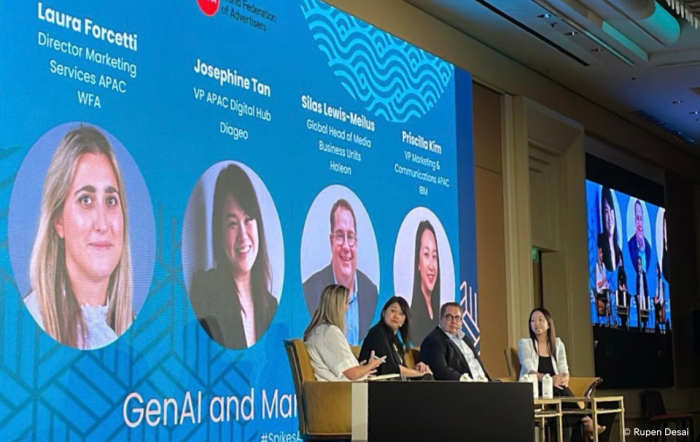Get analysis, insight & opinions from the world's top marketers.
Sign up to our newsletter.
As more brands and agencies get excited by generative AI (GenAI), WFA’s Director of Global Sourcing, Laura Forcetti, hosted a panel at Spikes Asia exploring the intersection between GenAI and the foundations of effective marketing. Here are the key lessons:

A lot is happening right now. AI is taking centre stage and change is in the air. But there is also lots that won’t change. The difference was summed up at a panel at Spike Asia in Singapore featuring some expert witnesses to the impact of GenAI.
Josephine Tan, Vice President APAC Digital Hub at Diageo, Silas Lewis-Meilus, Global Head of Media Business Units at Haleon, and Priscilla Kim, Vice President Marketing & Communications APAC at IBM, talked about what AI will change and what won’t.
All of them had a shared goal: make AI a durable and positive solution for your brand, while also distinguishing yourself from a sea of sameness (since everyone can use GenAI and it’s free, differentiation becomes a major challenge).
We started by highlighting what won’t change.
Haleon’s Silas Lewis-Meilus acknowledged the industry’s passion for the new, shiny thing: “We are an industry that is a bit notorious for chasing shiny things and that's fine, it's yielded some amazing changes in our industry. But I hope that what we don't lose is that ability to focus on those priorities, make sure that the work that we do yields a positive incremental result on our businesses and the work that we are trying to accomplish.”
Diageo’s Josephine Tan said it was about what GenAI could add. “One thing that has never changed in marketing is the ability for brands to understand the landscape they operate in, tap into those consumer insights, to then generate campaigns, marketing ideas, that will help brands achieve growth. GenAI can help us do this quicker and more efficiently, but that is a fundamental of marketing that is here to stay”, she said.
Part of the challenge of staying on the straight and narrow of marketing fundamentals, however, is managing expectations and internal FOMO.
According to Josephine Tan, people can look to the recent past when marketers struggled to get budget to test digital advertising. “Looking back 15-20 years, securing even 1% of the marketing budget for digital efforts was a struggle. Now, as the landscape has evolved, there is a general shift towards the other end of the spectrum with a lot of enthusiasm to embrace concepts like Web3, Blockchain or GenAI. Harnessing this energy is crucial,” she said.
“Having a sound strategy and prioritisation are essential to focus on what matters for our organisations. We must focus ourselves into those areas where the impact is felt. GenAI can help with scaling that impact, if used for the right things,” added Silas Lewis-Meilus.
The conversation then moved on to the role of external partners and what advertisers should expect in terms of support.
IBM’s Priscilla Kim referred to a global CMO study her company had ran – more than 60% of the CMOs said they’d be deploying AI in the next 12 months, and 55% said they expect their relationship with agency partners to change because of GenAI.
Her key recommendations were:
Josephine Tan emphasized the importance of agencies being clear about biases and aligning with the goals of their clients, positioning agencies as partners that clients can trust in navigating the challenges of AI.
And Silas Lewis-Meilus pointed out that just as with digital, new technology such as AI was creating an opportunity for specialist expertise. “What agencies bring to clients is the people they have. More and more, it’s that human touch, and human thinking that is going to make AI work the hardest for us. There are tons of opportunities for optimisation, that can be balanced with human oversight and brand considerations,” he said.
To sum up, the challenge is not that GenAI will steal our jobs, but that someone using AI better than us might do. The time has come for our industry to upskill – without becoming professional coders or programmers – and understand the potential for GenAI as a marketing technology.

For more information or questions, please contact Gabrielle Robitaille at G.robitaille@wfanet.org